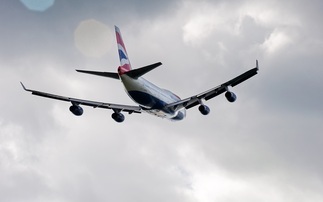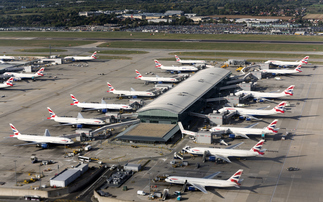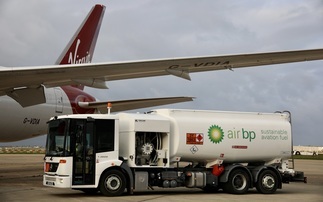Rules to avoid double-counting of emissions cuts are a step forward, say campaigners, but more assurances are needed to meet the sector's climate promises
Negotiators have agreed rules to prevent double-counting of carbon credits used to offset airline emissions, at a meeting of the International Civil Aviation Organization (Icao) Council in Montreal, Canada.
The sector has committed to carbon-neutral growth from 2020. As air traffic growth outpaces efficiency improvements, airlines will be expected to pay for emissions reductions in other sectors to offset the climate impact.
In a closed-room meeting, Icao adopted broad criteria to ensure those carbon offsets are not also counted towards national targets and represent extra emissions savings. That was reported by NGO observers and confirmed on Twitter by French negotiator Philippe Bertoux. The press office did not respond to a request for comment.
Climate campaigners welcomed the decision, but said more was needed to meet the industry's promises. They are also calling for an age limit on eligible carbon offsetting projects and transparency around the way the rules are put into practice.
"This decision is a step forward," said Gilles Dufrasne, policy officer at Carbon Market Watch, "but without setting an ambitious restriction on the age of eligible credits for the scheme, it could mean a giant setback for climate action. The aviation industry needs to face the reality that only new carbon reductions can deliver its goal of carbon neutral growth."
There is a huge pool of dormant projects under the UN's Clean Development Mechanism that could, in theory, meet demand from airlines for carbon offsets. Analysts at New Climate Institute estimate 82 per cent of the available supply would continue cutting emissions with or without the extra revenue.
Researchers from the same think-tank urged Icao to ban projects started before 2016 from taking part in the aviation carbon market, in a commentary for Nature Climate Change last month.
Another critical issue is the make-up of a technical advisory body, which will be responsible for interpreting and applying the rules.
Annie Petsonk, aviation expert at Environmental Defense Fund, warned that it risked being shrouded in secrecy and vulnerable to industry lobbying. "We don't want Icao to become the Fifa of carbon markets," she told Climate Home News, referring to the football governing body's record of corruption.
The Icao Council meeting runs until 15 March. It is not clear whether negotiators will settle outstanding questions around the carbon market's operation at this session.
While airlines are eager to learn the details for their planning, Petsonk noted they will not need to start buying offsets until 2023. "It is more important to get it right than to rush it," she said.
The industry's Air Transport Action Group endorsed the newly agreed rules. "It is important for the industry that strong sustainability standards are applied for the types of eligible offsets," said director Michael Gill in a statement.
Meanwhile, some argue the sector should be paying more for its climate pollution. At a meeting of EU environment ministers on Tuesday, Belgium's Jean-Luc Crucke called for the bloc to impose taxes on air travel.
This article first appeared at Climate Home News







